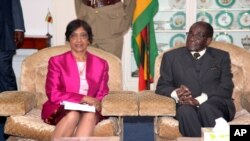United Nations High Commissioner for Human Rights Navi Pillay - ending a weeklong rights assessment mission in Zimbabwe Friday - urged President Robert Mugabe to delay calling fresh elections without democratic reforms, saying doing so would be catastrophic for the nation.
Pillay also called on Western countries, including the United States and Britain to "suspend" the sanctions they imposed on Mr. Mugabe and his inner circle over human rights violations "at least until the conduct and outcome of the elections and related reforms are clear.”
Mugabe - in power since independence in 1980 - and his Zanu PF party have repeatedly condemned the restrictive measures and demanded their unconditional removal saying they hurt the economy and impacting lives of ordinary Zimbabweans.
The 88-year-old veteran leader has insisted on a general election this year, even without a new constitution and other key political reforms to disband the largely-dysfunctional unity government.
But Pillay urged caution saying if Mugabe made good his threats, the vote "could turn into a repeat of the 2008 elections which resulted in rampant politically-motivated human rights abuses, including killings, torture, rapes, beatings, arbitrary detentions, displacements and other violations."
The UN rights chief told a news conference in Harare that she was happy the country had established a human rights commission to deal with violations, and urged it to help government craft laws that promote human rights.
The former South African judge said the commission should not dwell too much into the past but focus on current and future abuses.
But she was quick to point out that violations committed during the run-up to the June 2008 presidential runoff vote and the so-called Gukurahundi era, should not be swept under the carpet.
A Truth and Reconciliation Commission, she said, could be formed to deal with such cases.
Justice Minister Patrick Chinamasa, a Zanu PF official, quickly responded to Pillay's remarks saying Zimbabwe is a sovereign state which should not be dictated to on internal affairs, including when to hold elections.
He also said sanctions should be totally removed and not suspended as suggested by Pillay.
"We do not want any talk about the suspension of sanctions," Chinamasa said. "They have to be lifted unconditionally. Any suspension will be taken in bad faith on out part because these sanctions should have never been imposed in the first place."
Pillay said the UN was contemplating dispatching a human rights adviser to Zimbabwe.
During her tour, at the invitation of the government, the UN rights envoy held consultative meetings with President Mugabe, Prime Minister Morgan Tsvangirai and civil society groups.





